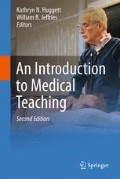Abstract
Assessment bridges the gap between teaching and learning. Perhaps second only to teaching, assessing student performance is a fundamental role in the life of a teacher. Assessment is important because it provides students with feedback about their performance; this information reinforces their areas of strength and highlights areas of weakness. Using this feedback, students can direct their study strategies and seek additional resources to improve their performance.

Access this chapter
Tax calculation will be finalised at checkout
Purchases are for personal use only
References
Amin Z, Seng CY, Eng KH (2006) Practical guide to medical student assessment. World Scientific Publishing Company, Singapore
Anderson L, Krathwohl D (eds) (2001) A taxonomy for learning, teaching, and assessing: a revision of Bloom’s taxonomy of educational objectives. Longman, New York
Buckley S, Coleman J, Davison I, Khan K, Zamora J (2009) The educational effects of portfolios on undergraduate student learning: a Best Evidence Medical Education (BEME) systematic review. BEME Guide No. 11. Med Teach 31:282–298
Case S, Swanson D (2002) Constructing written test questions for the basic and clinical sciences, Third edition (revised). National Board of Medical Examiners. Available at: http://www.nbme.org/pdf/itemwriting_2003/2003iwgwhole.pdf
Cashin W (1987) iDEA Paper #17: Improving essay tests. The iDEA Center, Center for Faculty Evaluation and Development, Kansas State University. Available from:http://www.theideacenter.org/sites/default/files/Idea_Paper_17.pdf
Challis M (1999) AMEE medical education guide no. 11 (revised): portfolio-based learning and assessment in medical education. Med Teach 21:370–386
Cook D, Beckman T (2006) Current concepts in validity and reliability for psychometric instruments: theory and application. Am J Med 119:166.e7–166.e16
Epstein R, Hundert E (2002) Defining and assessing professional competence. J Am Med Assoc 287(2):226–235
Fitzgerald J, White C, Gruppen L (2003) A longitudinal study of self-assessment accuracy. Med Educ 37(7):645–649
Gray J (1996) Global rating scales in residency education. Acad Med 71:S55–S63
Hardin R, Gleeson F (1979) Assessment of medical competence using an objective structured clinical examination (OSCE). Med Educ 13(1):41–54
Holmboe E, Hawkins R, Huot S (2004) Effects of training in direct observation of medical residents’ clinical competence: a randomized trial. Ann Intern Med 140(11):874–881
Mancall EL, Bashook PG (eds) (1995) Assessing clinical reasoning: the oral examination and alternative methods. American Board of Medical Specialties, Evanston
Mehrens WA, Lehmann IJ (1991) Measurement and evaluation in education and psychology, 4th edn. Holt, Rinehart and Winston, Fort Worth
Miller G (1990) The assessment of clinical skills/competence/performance. Acad Med 65(9):S63–S67
Miller AH, Imrie BW, Cox K (1998) Student assessment in higher education. In: A handbook for assessing performance. Kogan Page, London
Rademaker J, ten Cate T, Bar P (2005) Progress testing with short answer questions. Med Teach 27(7):578–582
Raksha J, Ling F, Jaeger J (2004) Assessment of a 360-degree instrument to evaluate residents’ competency in interpersonal and communication skills. Acad Med 79(5):458–463
Sepdham D, Julka M, Hofmann J, Dobbie A (2007) Using the RIME model for learner assessment and feedback. Fam Med 39(3):161–163
Shumway J, Harden R (2003) AMEE Guide No. 25: the assessment of learning outcomes for the competent and reflective physician. Med Teach 25(6):569–584
Tekian A, McGuire C, McGaghie W (eds) (1999) Innovative simulations for assessing professional competence. University of Illinois Press, Chicago
Wallace P (2007) Coaching standardized patients. Springer, New York
Author information
Authors and Affiliations
Corresponding author
Editor information
Editors and Affiliations
Rights and permissions
Copyright information
© 2014 Springer Science+Business Media Dordrecht
About this chapter
Cite this chapter
Mavis, B. (2014). Assessing Student Performance. In: Huggett, K., Jeffries, W. (eds) An Introduction to Medical Teaching. Springer, Dordrecht. https://doi.org/10.1007/978-94-017-9066-6_15
Download citation
DOI: https://doi.org/10.1007/978-94-017-9066-6_15
Published:
Publisher Name: Springer, Dordrecht
Print ISBN: 978-94-017-9065-9
Online ISBN: 978-94-017-9066-6
eBook Packages: Biomedical and Life SciencesBiomedical and Life Sciences (R0)

